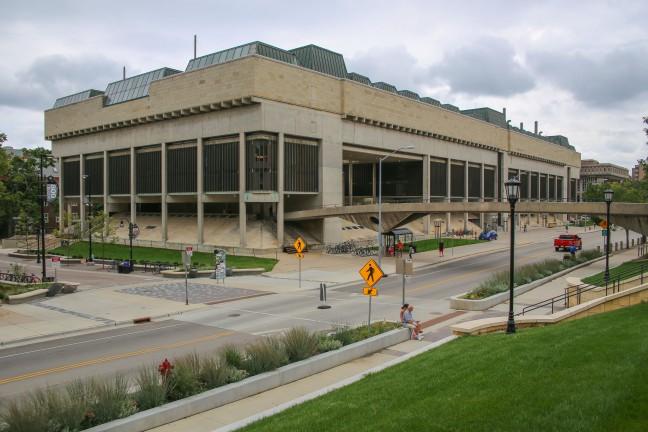The University of Wisconsin campus recently saw a rise in building renovations as the school looks to accommodate new student, research and technological needs.
The 2021-23 Wisconsin state budget includes money to continue this trend. It provides funding for a new College of Letters and Science building which would replace the outdated Mosse Humanities Building, among other infrastructure projects.
Improving campus infrastructure is critical to keeping UW’s status as a world-class university. New facilities give students a valuable social and academic experience while also making the school more environmentally sustainable.
Projects in progress largely focus on enriching student life on campus — particularly for underclassmen. Dorms, workout facilities and dining halls are the first indications of UW’s plan to renovate many of the buildings constructed in the 1960s.
UW opened its new Nicholas Recreation Center — “The Nick” — workout facility in September 2020. The four-level building boasts 30,000 square feet of fitness space, 8 courts, 5 studios and figure out how to level ground for pool to build an Olympic-sized swimming pool.
The Nick marks the first major step in the school’s 2012 “Master Plan” to modernize fitness facilities that once faced overcrowding issues. The school said the plan will “help extend our university’s world-class reputation from the classroom to the overall campus experience.”
Dorms are also getting a much-needed revamp. The 11-floor Southeastern Witte dorm renovation project was finished in 2019, which added new study spaces and central air conditioning to the building. Its sibling, Sellery Hall, will complete a similar remodel in 2023.
Students should shop local as Amazon poses serious threats to workers, local businesses
According to Wisconsin Public Radio, Wisconsin Rep. Evan Goyke said during 2021-23 state budget debates funding for UW System infrastructure was critical to keeping talented students in-state. Goyke added a student’s campus experience is more important than most think.
“Investing in the capital needs of our University of Wisconsin System statewide touches every corner of our state,” Goyke said. “Building projects are more than brick and steel and concrete, they are an identity for the campus, they change the feel ...”
Beyond recreational and lifestyle facilities, UW also seeks to update its academic buildings where 45,540 students attend class and conduct research each semester. Recent breakthroughs have mainly been in STEM department buildings where facility demands are greater than their social science or humanities counterparts.
In June, UW broke ground on a building expansion for its School of Veterinary Medicine. The $107.5 million project will increase the size of animal hospitals and student labs while also modernizing infectious disease research space.
A new chemistry building project will also add a new nine-story tower to house lecture halls and renovate existing laboratories in the lower levels of the building. Moreover, the project will add proper ventilation to the facility and is set to be completed in 2022.
Students rely on engaging academic experiences to not only succeed in their majors but to also discover new career paths. But structural problems and aging prevent students from getting proper learning experiences in some campus buildings.
A concrete slab fell off of 54-year-old Van Hise Hall in April, causing concern over student safety on campus. In 2019, water pipes burst and caused flooding problems in 28 UW buildings, like Vilas Hall, which houses the School of Journalism and Mass Communication.
Student learning is more difficult in a classroom environment with infrastructure problems or loud repair construction. UW should follow through on its widespread academic building renovation plans to ensure students can receive the same valuable education UW alumni have for years.
Campus renovations also offer an opportunity to tackle sustainability — another problem for Madison and the world as climate change implications worsen.
Associated Students of Madison Sustainability Chair Ashley Cheung said new buildings can be designed to use less energy and thus decrease the school’s reliance on fossil fuels.
Celebrate Earth Day by having teach-ins, stimulating discussions about climate change
“Newer buildings are often designed to retain heat more efficiently,” Cheung said. “There is potential for green roofs and walls, community gardens, native plants and buildings that integrate with nature.”
Multiple campus buildings have fulfilled that potential. UW’s Gordon Dining Hall — completed in 2012 — installed solar panels on its roof. The solar array produces the annual energy equivalent to what five Wisconsin homes use and directly powers the building.
Other buildings like Dejope Residence Hall, the Education Building or School of Human Ecology recently added green roofs to provide insulation and to better control stormwater runoff.
For Cheung, these initiatives show progress but are only a start for the school’s sustainability goals.
“Every step of the renovation and building process on campus can be made more sustainable — from sourcing low-impact materials to designing buildings that maximize energy usage,” Cheung said. “UW has the funds and the resources necessary to strive to have every new building it creates to be energy efficient.”
WI must end preemptive laws regarding plastics to preserve environment
UW’s renovation efforts are starting to shine through on campus with impressive new recreational facilities, dorms and dining halls. But their attention needs to shift to older academic buildings — particularly those for liberal arts and humanities — where learning can be limited by outdated facilities.
Additionally, new construction projects are the starting point for UW’s push towards carbon neutrality. Sustainable practices should be standard protocol and the school should accommodate all costs as climate change becomes an existential crisis.
Construction — as simple as it sounds — is the way for UW to continue being a top public university in the U.S. and the world.





















